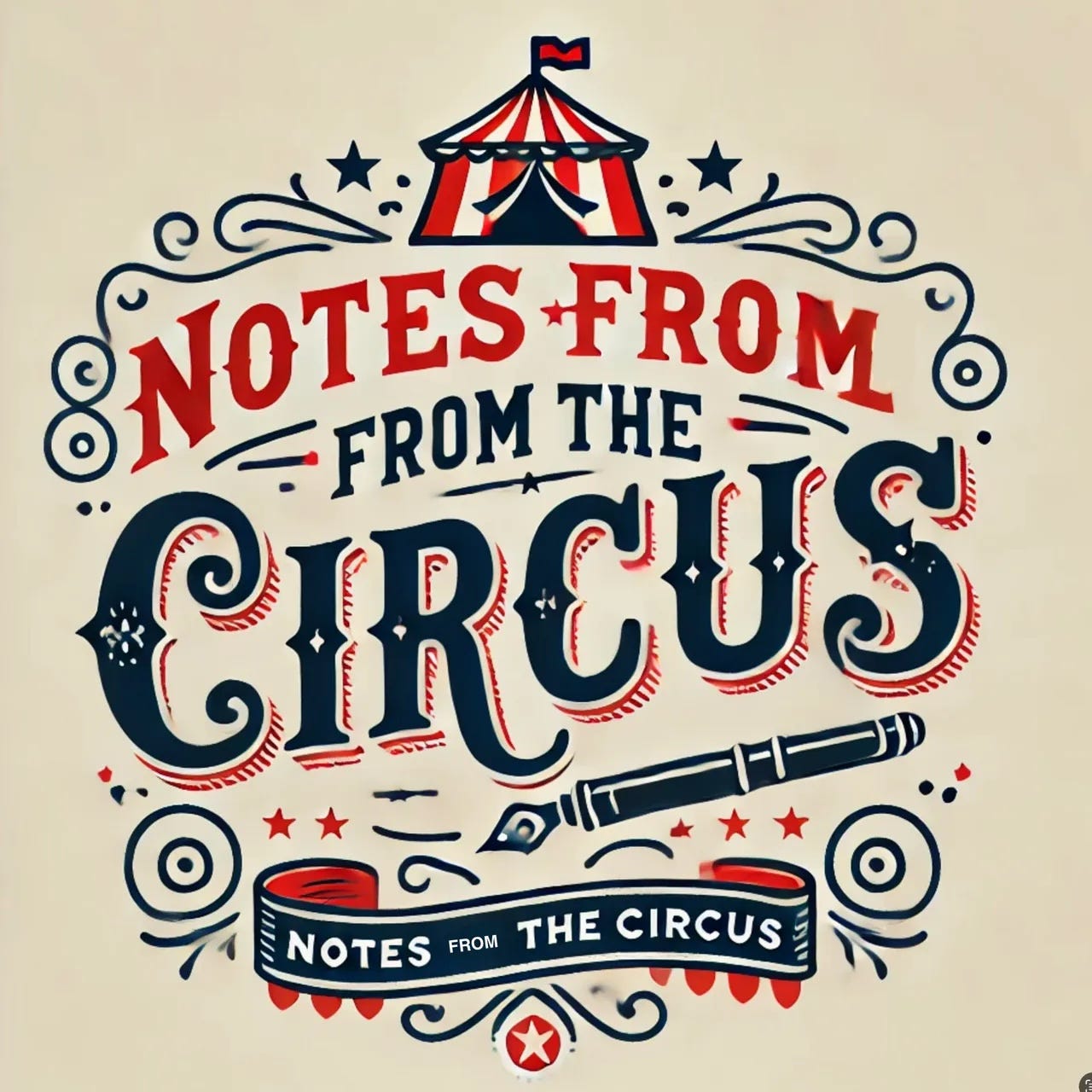The Cycle Theory of Moral Cowardice
Jason Calacanis and the Sophisticated Art of Excusing Everything
Jason Calacanis thinks he’s discovered a profound law of American politics: “Hillary made Trump / Trump made Mamdani / Mamdani will make...” — an ellipsis so pleased with itself it practically applauds. What vapid political insight. What empty performance in the costume of wisdom. This is a man who mistakes detachment for wisdom, and non-commitment for sophistication.
Let’s start with the obvious problem, which I pointed out immediately: “By this logic, FDR should have resulted in Ultra-Hitler.”
If Calacanis’s cycle theory held—if opposition to authoritarianism reliably produces more extreme authoritarianism in response, if resisting fascism creates super-fascism, if every pushback against concentrated power generates an even more concentrated power in reaction—then the Allied victory in World War II should have produced something worse than the Third Reich. The civil rights movement should have created something more oppressive than Jim Crow. The American Revolution should have spawned a monarch more tyrannical than George III.
The logic doesn’t just fail. It collapses into absurdity the moment you apply it to any historical example where we have the benefit of knowing what actually happened.
Calacanis confuses symmetry with insight, and moral paralysis with balance.
Which means this isn’t actually a theory about causation at all. It’s something else entirely—an intellectual machine that converts moral judgment into cycles of inevitability, that treats democratic resistance as functionally equivalent to authoritarian escalation, that positions every political actor as merely the product of whoever preceded them. Hillary Clinton and Donald Trump aren’t moral actors making choices—they’re just links in a chain, each calling the next into being through their very existence.
This is sophisticated nihilism dressed in the language of systems thinking. It sounds wise because it mimics the structure of legitimate causal analysis while evacuating all the content that makes such analysis meaningful. Yes, political actors respond to each other. Yes, movements generate counter-movements. But the cycle theory doesn’t actually examine what those actors believe, what they’re trying to accomplish, or whether their responses represent moral progress or moral catastrophe. It just asserts that they’re all part of the same inexorable pattern, each as predictable and inevitable as the last.
Strip away the pseudo-systems language and you’re left with cowardice in algorithmic form.
The genius—and I use that word in its most contemptuous sense—is that this framework requires no moral courage whatsoever. You never have to say Trump’s authoritarian project is worse than Clinton’s centrist liberalism because they’re just phases in a cycle. You never have to evaluate whether Mamdani’s democratic socialism represents legitimate working-class politics or dangerous extremism because he’s just what Trump “made.” You never have to risk being wrong about which direction represents progress and which represents catastrophe because all directions are just movements in the eternal dance.
Most importantly, you never have to risk being on the losing side. Because when everyone is both cause and effect, when every position is just a reaction to what came before, you can position yourself as the wise observer who sees the pattern rather than the partisan who picks a side. And when the cycle turns—when Trump wins or Mamdani wins or someone else entirely wins—you were never really committed to opposing them anyway. You were just noting their place in the sequence.
What he calls moderation is simply moral flexibility formatted for investors.
To understand how completely this framework serves to avoid moral judgment, consider Calacanis’s appearance on Tim Miller’s Bulwark Podcast. When confronted with the administration’s immigration cruelty—the disappearances to foreign gulags, the raids at Home Depots, the systematic terrorization of people who’ve been here for decades—Calacanis retreats into a word that does all the work of moral abdication while sounding sophisticated: “performative.”
“I think it’s as abhorrent as you and I agree it is. I think it’s performative.”
The administration has stated its goal is net negative migration. They’ve massively expanded ICE funding. They’re conducting raids. They’re disappearing people to El Salvador’s torture prisons. But Calacanis has decided—based on nothing but his need for it to be true—that this is all just “performance.”
Miller pushes: “They just added a budget to make ICE the biggest funded. ICE is going to have a bigger budget than the Israeli military this year. What are they going to do? Nothing? Just sit around? Watch old Superman episodes?”
Calacanis: “I think they’re going to just try to find as many criminals as they can that they don’t have anybody complaining about a violent criminal being deported, a gang member. I really do think it’s performative. That’s my belief.”
That’s my belief. Not based on their stated goals. Not based on their actions. Not based on the budget they just passed or the people they just hired or the raids they’re conducting. Based on his need for it to be performative so he doesn’t have to make the moral judgment that might cost him something.
This is the cycle theory made flesh—the systematic construction of a worldview where you never have to call anything what it is because everything is always something else, always strategy, always performance, always just a move in the eternal game.
When Miller asks the question that should be simple—”Is Donald Trump a good person?”—watch Calacanis perform the most elegant retreat in modern political discourse:
“I can’t see into the man’s heart. If you looked at his behavior, you would find a lot of behaviors that would be suboptimal.”
Suboptimal. This is the language of someone reviewing a quarterly earnings report, not someone evaluating whether the President of the United States possesses basic human decency. Behaviors that would be “suboptimal.” Not cruel. Not authoritarian. Not disqualifying for someone holding the highest office in the land. Suboptimal.
Miller tries one more time, asking if there’s anything Calacanis would want his three kids to model themselves after Trump on. And here, finally, Calacanis lands on something: “He’s quite charming. I will give him that. He is. That guy is a charmer. I mean, I have seen him take very, very strong men and just...”
The charm of a con artist. The charisma of a sociopath. The ability to manipulate powerful men into abandoning their principles. This is what passes for a compliment when you’ve constructed a framework that makes it impossible to say what should be obvious: No, the President is not a good person, and his behavior is not “suboptimal”—it’s a systematic assault on everything constitutional democracy requires.
There’s a difference between nuance and anesthesia, and Calacanis sells the latter.
I wrote previously about Calacanis’s “balls and strikes“ framework—his insistence that we evaluate each Trump action independently, divorced from context or cumulative pattern. The cycle theory is the same intellectual disease in different form. Both frameworks share the common feature of allowing their practitioner to never make moral commitments that might prove costly, never take positions that might limit future options, never stand for principles that might conflict with access to power.
When I warned him in 2022 about Curtis Yarvin’s influence over Peter Thiel and J.D. Vance, his response was swift dismissal: “No one cares about their ideas... they are completely irrelevant.” Now Vance is Vice President implementing exactly the neo-reactionary theories Calacanis claimed were too fringe to worry about. Has this affected his framework? Not at all. Because the framework isn’t designed to track reality or make accurate predictions. It’s designed to provide cover for never having been wrong because you were never really committed to anything in the first place.
The pattern is consistent across everything Calacanis produces. When the All-In Podcast discusses nuclear weapons with the same energy they bring to marketing their $400 tequila, when they transition seamlessly from product placement to geopolitical catastrophe without any sense that different subjects might require different moral registers, Calacanis performs his role as the “journalist” among them—asking just enough skeptical questions to maintain his brand while ensuring none of those questions threaten the fundamental interests of his wealthy co-hosts. He’s the court jester for oligarchs, providing the appearance of independent thought while systematically protecting power from accountability.
The cycle theory tweet crystallizes what Calacanis has become: a man so committed to remaining uncommitted, so dedicated to positioning himself above moral judgment, so invested in the appearance of sophisticated analysis, that he’s constructed an intellectual framework that literally cannot distinguish between democratic governance and authoritarian capture, between legitimate political resistance and fascist reaction, between Hillary Clinton and Donald Trump.
When confronted with actual moral distinctions—when forced to acknowledge that some political movements represent progress while others represent catastrophe, that some leaders protect democratic institutions while others systematically destroy them—Calacanis retreats into the cycle theory. They’re all just phases. They all made each other. The wise man sees the pattern and rises above it.
This would be less contemptible if Calacanis were actually ignorant. But he’s not. He’s been in these circles long enough to understand exactly what’s happening. He’s seen the Thiel network up close. He’s watched the neo-reactionary project move from fringe theory to implemented policy. He’s observed the systematic capture of democratic institutions by oligarchic interests. He knows what he’s doing when he treats all of this as just another turn of the wheel.
That’s what makes the cycle theory so perfectly emblematic of his entire intellectual project. It’s not the error of someone who hasn’t thought carefully about politics. It’s the calculated framework of someone who has thought very carefully about how to maintain influence across political divides without ever taking genuine moral stands. It’s the weathervane behavior of someone who needs to always be positioned for access to whoever wins, dressed up in the language of sophisticated systems thinking.
The “moderate” brand Calacanis has constructed isn’t moderation at all. It’s strategic non-commitment. It’s the intellectual infrastructure of someone who values access over principles, who mistakes moral flexibility for wisdom, who has convinced himself that refusing to make moral judgments represents a higher form of analysis rather than moral abdication.
Hillary Clinton didn’t “make” Donald Trump. Democratic resistance to authoritarianism doesn’t “make” authoritarian escalation. The cycle theory isn’t profound wisdom about political causation. It’s sophisticated machinery for excusing everything while committing to nothing, for appearing wise while avoiding judgment, for maintaining access while abandoning principle.
And Jason Calacanis knows this. That’s what makes it contemptible rather than merely stupid. He’s smart enough to recognize the moral emptiness of his framework. He’s sophisticated enough to understand that treating all political movements as equivalent phases in an endless cycle serves oligarchic interests by delegitimizing democratic resistance. He’s been around long enough to see the actual consequences of this kind of thinking.
He just values positioning himself to win regardless of who wins more than he values defending the constitutional democracy that makes his particular grift possible in the first place.
This is the logic of every age’s comfortable man: to stand equidistant between courage and complicity and call it perspective. History remembers them all.
Courage requires a side. And that is certainly not what we’re looking at here. Pathos is more like it.





Another piece resonated with me today on moral cowardice on the matter of truth versus lies.
"This is the cop-out I hate the most. The lazy negation of the idea of morality and a nuanced spectrum between good and evil. The cowardly act of renouncing responsibility, and the self-loathing tendency for people to annihilate their own agency, seeking cynicism, sarcasm, blame, resentment and grievance instead of acting, rather than choosing to trust and put any effort into hard thinking. It’s a form of gross cowardice, is intellectually bankrupt and entirely self-destructive. But this is a classic Kremlin tactic - spread confusion and ambiguity, doubt and ultimately distrust. It’s a form of digital nihilism, and its utterly corrosive. Unfortunately, the algorithms are aligned with the worst behaviours and instincts."
https://open.substack.com/pub/siliconcurtain/p/army-of-fakes
The way I’ve put it when encountering this “political science” — “There is no fucking pendulum.”